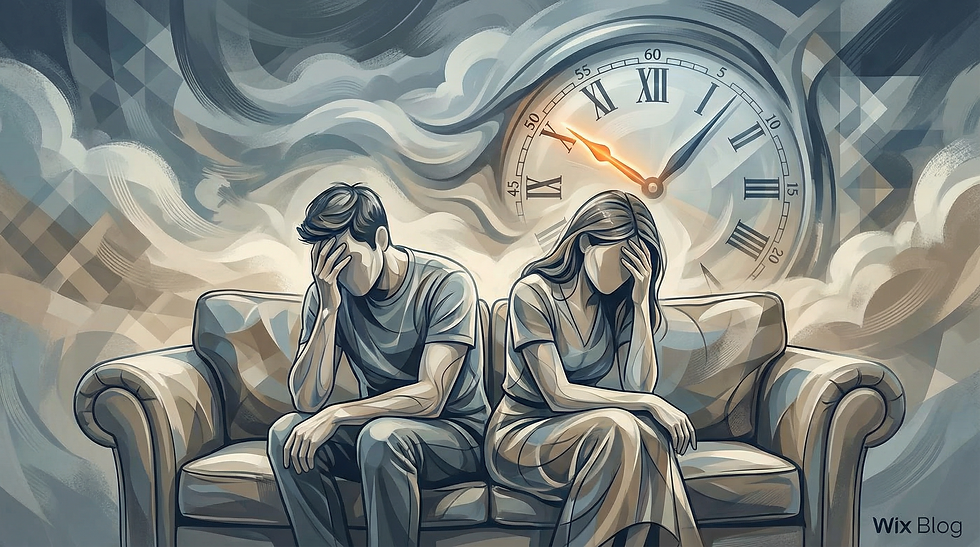What to Expect in Your First Therapy Session (And Other FAQs)
- Rawda Tomoum
- Nov 30, 2022
- 4 min read
Updated: Oct 8

Many people contemplate starting therapy but often hesitate several times before making the decision. Several clients have asked me about what to expect from therapy and whether there's anything they should do or bring to their session. For many people, therapy is very abstract, and it's often a bit daunting treading towards an unknown.
That's why I have decided to share a few helpful information to ease you a bit. I'll divide it into two blog posts: one talking about what to expect from therapy in general, and another (this one) talking about the first therapy session in particular. And that's because the first session is actually very different from other therapy sessions moving forward.
Click here for a bulleted summary of the whole thing.
1. Is there anything I need to do or bring to therapy?
In other regular sessions, you and your therapist may agree on certain tasks to do between sessions after which you share it with your therapist the next session. But for the very first session, you don't need to bring anything. Just yourself :).
2. What will we talk about?
The first session is called the "intake." You're expected to share only a brief summary of what brought you to therapy, and a short assessment of how you're doing in terms of mood, sleep, and other aspects of wellbeing. But that's not the time when we dig deep into what's going on.

It really is about your therapist "taking in" as much information about your background and where you come from as a person. For example, you can expect questions about your educational and professional background; the structure of your family now and growing up; the kind of social support you have; and a general overview of your lifestyle. You can also expect questions about your medical or psychiatric history (like previous experiences with therapy) if there is any.
While this may not be the core of your present concerns, it is still crucial information for your therapist. It helps us get a "snippet" of what's been going on in your life and how it looks like. Think of it as the "vitals" they always check for with every doctor's visit. Except in therapy, we just do it once at the beginning of therapy.
3. I don't open up easily. I don't know what to talk about.
These are probably the most common things I hear as a therapist. The good news is that it's not your responsibility to make yourself talk. That's not on you. As your therapist, it is my job to ask you the right questions, and most importantly, it is my responsibility to help you feel safe and comfortable enough to share. And you don't have to share everything from the get-go. We can take our time for you to build enough trust or until you're ready to share those challenging pieces of your story.

4. What if I don't feel comfortable with my therapist?
Your relationship with your counselor is the most important thing about therapy. You do need to feel good chemistry between the two of you. Sometimes you "click" from the first meeting, and sometimes it takes a couple more sessions to start feeling a positive connection between the two of you.
If you still don't feel comfortable with your therapist, don't give up on therapy. You will find your match, but only if you keep looking. When you find a counsellor who specializes in the area you need help with, try looking at their website and/or their social media profiles (if they have one). See if you can sense some comfort from reading or knowing about them, or from what they're telling you through their page.
5. How do I tell my therapist that I don't wish to continue?
Therapists know that they can't expect to be everyone's match. A good therapist will want what's best for you, and being comfortable with your therapist is on top of the list! You can simply tell them, "I don't feel this is the best fit for me." This should be enough to kindly communicate that you'd rather continue with someone else. They may even offer you a few suggestions of other counsellors you can work with.
In a nutshell, what should I expect from my first therapy session?
You're expected to share only a brief summary of what's going on.
You will give a historical summary of who you are (education, profession, relevant medical and psychiatric history, and lifestyle).
You don't need to worry about forcing yourself to open up. It's your therapist's responsibility to make you feel safe and comfortable enough to share.
You don't have to share EVERYTHING from day 1. You can take your time.
It's important to feel good chemistry with your therapist. If you don't after 2 or 3 sessions, don't give up on therapy. Find another therapist.
If you wish to discontinue, you can simply say, "I don't feel this is the best fit for me."
Let me know what other questions you have about starting therapy. Share your thoughts in the comments and what topics you'd like addressed!
And as always, if you need someone to talk to, you can always reach out to info@tomoumcounselling.com, call/text 604-800-5154, or book a free consultation.




Comments